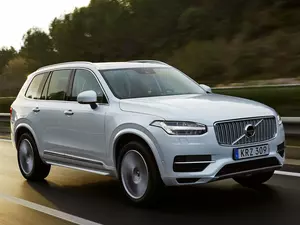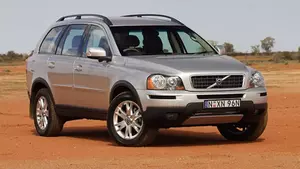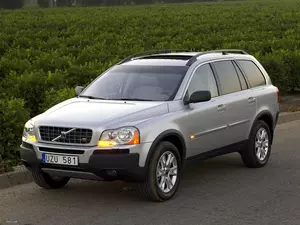
| Vehicle | Precise engine size | Difference from world average | Engine size to consumption ratio | Horsepower from 1 L | Engine size to 100 kg of weight |
|---|---|---|---|---|---|
| 2.0 T5 |
1.97 L (1969 cc) |
16.1% smaller | 66 cc to 1 mpg | 127 hp from 1 L | - |
| 2.0 T6 |
1.97 L (1969 cc) |
16.1% smaller | 68 cc to 1 mpg | 157 hp from 1 L | - |
| 2.0 B5 |
1.97 L (1969 cc) |
16.1% smaller | 48 cc to 1 mpg | 119 hp from 1 L | 94 cc to 100 kg |
| 2.0 T8 TwEn |
1.97 L (1969 cc) |
16.1% smaller | 19 cc to 1 mpg | 154 hp from 1 L | 86 cc to 100 kg |
| Vehicle | 2.0 T5 |
|---|---|
| Precise engine size | 1.97 L (1969 cc) |
| Difference from world average | 16.1 smaller |
| Engine size to consumption ratio | 66 cc to 1 mpg |
| Horsepower from 1 L | 127 hp from 1 L |
| Engine size to 100 kg of weight | - |
| Vehicle | 2.0 T6 |
| Precise engine size | 1.97 L (1969 cc) |
| Difference from world average | 16.1 smaller |
| Engine size to consumption ratio | 68 cc to 1 mpg |
| Horsepower from 1 L | 157 hp from 1 L |
| Engine size to 100 kg of weight | - |
| Vehicle | 2.0 B5 |
| Precise engine size | 1.97 L (1969 cc) |
| Difference from world average | 16.1 smaller |
| Engine size to consumption ratio | 48 cc to 1 mpg |
| Horsepower from 1 L | 119 hp from 1 L |
| Engine size to 100 kg of weight | 94 cc to 100 kg |
| Vehicle | 2.0 T8 TwEn |
| Precise engine size | 1.97 L (1969 cc) |
| Difference from world average | 16.1 smaller |
| Engine size to consumption ratio | 19 cc to 1 mpg |
| Horsepower from 1 L | 154 hp from 1 L |
| Engine size to 100 kg of weight | 86 cc to 100 kg |

| Vehicle | Precise engine size | Difference from world average | Engine size to consumption ratio | Horsepower from 1 L | Engine size to 100 kg of weight |
|---|---|---|---|---|---|
| 2.0 T6 |
1.97 L (1969 cc) |
16.1% smaller | 68 cc to 1 mpg | 157 hp from 1 L | 94 cc to 100 kg |
| 2.0 D5 |
1.97 L (1969 cc) |
16.1% smaller | 50 cc to 1 mpg | 119 hp from 1 L | 90 cc to 100 kg |
| 2.0 T8 |
1.97 L (1969 cc) |
16.1% smaller | 21 cc to 1 mpg | 154 hp from 1 L | 82 cc to 100 kg |
| 2.0 T5 |
1.97 L (1969 cc) |
16.1% smaller | 66 cc to 1 mpg | 127 hp from 1 L | 94 cc to 100 kg |
| 2.0 D4 |
1.97 L (1969 cc) |
16.1% smaller | 48 cc to 1 mpg | 96 hp from 1 L | - |
| Vehicle | 2.0 T6 |
|---|---|
| Precise engine size | 1.97 L (1969 cc) |
| Difference from world average | 16.1 smaller |
| Engine size to consumption ratio | 68 cc to 1 mpg |
| Horsepower from 1 L | 157 hp from 1 L |
| Engine size to 100 kg of weight | 94 cc to 100 kg |
| Vehicle | 2.0 D5 |
| Precise engine size | 1.97 L (1969 cc) |
| Difference from world average | 16.1 smaller |
| Engine size to consumption ratio | 50 cc to 1 mpg |
| Horsepower from 1 L | 119 hp from 1 L |
| Engine size to 100 kg of weight | 90 cc to 100 kg |
| Vehicle | 2.0 T8 |
| Precise engine size | 1.97 L (1969 cc) |
| Difference from world average | 16.1 smaller |
| Engine size to consumption ratio | 21 cc to 1 mpg |
| Horsepower from 1 L | 154 hp from 1 L |
| Engine size to 100 kg of weight | 82 cc to 100 kg |
| Vehicle | 2.0 T5 |
| Precise engine size | 1.97 L (1969 cc) |
| Difference from world average | 16.1 smaller |
| Engine size to consumption ratio | 66 cc to 1 mpg |
| Horsepower from 1 L | 127 hp from 1 L |
| Engine size to 100 kg of weight | 94 cc to 100 kg |
| Vehicle | 2.0 D4 |
| Precise engine size | 1.97 L (1969 cc) |
| Difference from world average | 16.1 smaller |
| Engine size to consumption ratio | 48 cc to 1 mpg |
| Horsepower from 1 L | 96 hp from 1 L |
| Engine size to 100 kg of weight | - |

| Vehicle | Precise engine size | Difference from world average | Engine size to consumption ratio | Horsepower from 1 L | Engine size to 100 kg of weight |
|---|---|---|---|---|---|
| 4.4 V8 |
4.41 L (4414 cc) |
88.2% bigger | 260 cc to 1 mpg | 71 hp from 1 L | - |
| 3.2i |
3.19 L (3192 cc) |
36.1% bigger | 168 cc to 1 mpg | 75 hp from 1 L | 152 cc to 100 kg |
| 2.4 D3 |
2.4 L (2400 cc) |
2.3% bigger | 83 cc to 1 mpg | 68 hp from 1 L | - |
| 3.2 |
3.19 L (3192 cc) |
36.1% bigger | 152 cc to 1 mpg | 76 hp from 1 L | - |
| 2.4 D5 |
2.4 L (2400 cc) |
2.3% bigger | 83 cc to 1 mpg | 83 hp from 1 L | 109 cc to 100 kg |
| 2.4d |
2.4 L (2401 cc) |
2.3% bigger | 92 cc to 1 mpg | 77 hp from 1 L | 114 cc to 100 kg |
| 2.5i |
2.52 L (2521 cc) |
7.5% bigger | 120 cc to 1 mpg | 83 hp from 1 L | 120 cc to 100 kg |
| 4.4i |
4.41 L (4414 cc) |
88.2% bigger | 245 cc to 1 mpg | 71 hp from 1 L | 210 cc to 100 kg |
| 2.4 D4 |
2.4 L (2400 cc) |
2.3% bigger | 83 cc to 1 mpg | 68 hp from 1 L | 114 cc to 100 kg |
| Vehicle | 4.4 V8 |
|---|---|
| Precise engine size | 4.41 L (4414 cc) |
| Difference from world average | 88.2 bigger |
| Engine size to consumption ratio | 260 cc to 1 mpg |
| Horsepower from 1 L | 71 hp from 1 L |
| Engine size to 100 kg of weight | - |
| Vehicle | 3.2i |
| Precise engine size | 3.19 L (3192 cc) |
| Difference from world average | 36.1 bigger |
| Engine size to consumption ratio | 168 cc to 1 mpg |
| Horsepower from 1 L | 75 hp from 1 L |
| Engine size to 100 kg of weight | 152 cc to 100 kg |
| Vehicle | 2.4 D3 |
| Precise engine size | 2.4 L (2400 cc) |
| Difference from world average | 2.3 bigger |
| Engine size to consumption ratio | 83 cc to 1 mpg |
| Horsepower from 1 L | 68 hp from 1 L |
| Engine size to 100 kg of weight | - |
| Vehicle | 3.2 |
| Precise engine size | 3.19 L (3192 cc) |
| Difference from world average | 36.1 bigger |
| Engine size to consumption ratio | 152 cc to 1 mpg |
| Horsepower from 1 L | 76 hp from 1 L |
| Engine size to 100 kg of weight | - |
| Vehicle | 2.4 D5 |
| Precise engine size | 2.4 L (2400 cc) |
| Difference from world average | 2.3 bigger |
| Engine size to consumption ratio | 83 cc to 1 mpg |
| Horsepower from 1 L | 83 hp from 1 L |
| Engine size to 100 kg of weight | 109 cc to 100 kg |
| Vehicle | 2.4d |
| Precise engine size | 2.4 L (2401 cc) |
| Difference from world average | 2.3 bigger |
| Engine size to consumption ratio | 92 cc to 1 mpg |
| Horsepower from 1 L | 77 hp from 1 L |
| Engine size to 100 kg of weight | 114 cc to 100 kg |
| Vehicle | 2.5i |
| Precise engine size | 2.52 L (2521 cc) |
| Difference from world average | 7.5 bigger |
| Engine size to consumption ratio | 120 cc to 1 mpg |
| Horsepower from 1 L | 83 hp from 1 L |
| Engine size to 100 kg of weight | 120 cc to 100 kg |
| Vehicle | 4.4i |
| Precise engine size | 4.41 L (4414 cc) |
| Difference from world average | 88.2 bigger |
| Engine size to consumption ratio | 245 cc to 1 mpg |
| Horsepower from 1 L | 71 hp from 1 L |
| Engine size to 100 kg of weight | 210 cc to 100 kg |
| Vehicle | 2.4 D4 |
| Precise engine size | 2.4 L (2400 cc) |
| Difference from world average | 2.3 bigger |
| Engine size to consumption ratio | 83 cc to 1 mpg |
| Horsepower from 1 L | 68 hp from 1 L |
| Engine size to 100 kg of weight | 114 cc to 100 kg |

| Vehicle | Precise engine size | Difference from world average | Engine size to consumption ratio | Horsepower from 1 L | Engine size to 100 kg of weight |
|---|---|---|---|---|---|
| 2.5 20V |
2.52 L (2521 cc) |
7.5% bigger | - | 83 hp from 1 L | 126 cc to 100 kg |
| 2.4 TDi |
2.4 L (2401 cc) |
2.3% bigger | - | 68 hp from 1 L | 114 cc to 100 kg |
| 2.8 24V |
2.78 L (2783 cc) |
18.6% bigger | - | 98 hp from 1 L | 133 cc to 100 kg |
| 2.9 T6 |
2.92 L (2922 cc) |
24.6% bigger | - | 93 hp from 1 L | 139 cc to 100 kg |
| 3.2 |
3.19 L (3192 cc) |
36.1% bigger | 160 cc to 1 mpg | 76 hp from 1 L | 145 cc to 100 kg |
| 2.4 D3 |
2.4 L (2400 cc) |
2.3% bigger | 83 cc to 1 mpg | 68 hp from 1 L | 114 cc to 100 kg |
| Vehicle | 2.5 20V |
|---|---|
| Precise engine size | 2.52 L (2521 cc) |
| Difference from world average | 7.5 bigger |
| Engine size to consumption ratio | - |
| Horsepower from 1 L | 83 hp from 1 L |
| Engine size to 100 kg of weight | 126 cc to 100 kg |
| Vehicle | 2.4 TDi |
| Precise engine size | 2.4 L (2401 cc) |
| Difference from world average | 2.3 bigger |
| Engine size to consumption ratio | - |
| Horsepower from 1 L | 68 hp from 1 L |
| Engine size to 100 kg of weight | 114 cc to 100 kg |
| Vehicle | 2.8 24V |
| Precise engine size | 2.78 L (2783 cc) |
| Difference from world average | 18.6 bigger |
| Engine size to consumption ratio | - |
| Horsepower from 1 L | 98 hp from 1 L |
| Engine size to 100 kg of weight | 133 cc to 100 kg |
| Vehicle | 2.9 T6 |
| Precise engine size | 2.92 L (2922 cc) |
| Difference from world average | 24.6 bigger |
| Engine size to consumption ratio | - |
| Horsepower from 1 L | 93 hp from 1 L |
| Engine size to 100 kg of weight | 139 cc to 100 kg |
| Vehicle | 3.2 |
| Precise engine size | 3.19 L (3192 cc) |
| Difference from world average | 36.1 bigger |
| Engine size to consumption ratio | 160 cc to 1 mpg |
| Horsepower from 1 L | 76 hp from 1 L |
| Engine size to 100 kg of weight | 145 cc to 100 kg |
| Vehicle | 2.4 D3 |
| Precise engine size | 2.4 L (2400 cc) |
| Difference from world average | 2.3 bigger |
| Engine size to consumption ratio | 83 cc to 1 mpg |
| Horsepower from 1 L | 68 hp from 1 L |
| Engine size to 100 kg of weight | 114 cc to 100 kg |